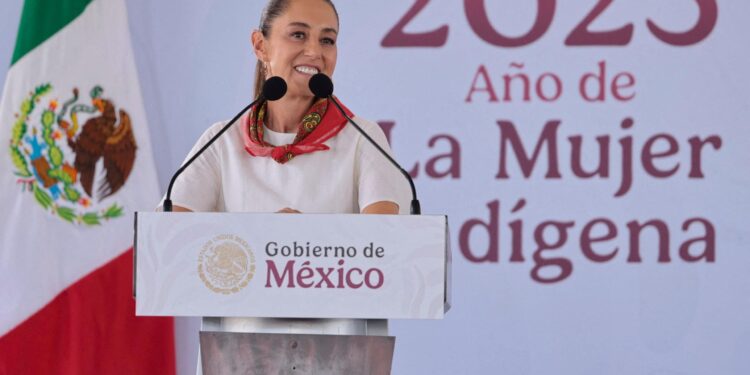(Reuters) -Mexican President Claudia Sheinbaum said on Saturday that U.S. President Donald Trump had proposed sending U.S. troops to Mexico to combat drug trafficking, but said she had rejected that offer because “sovereignty is not for sale.”
Sheinbaum’s comments were in response to questions about a Wall Street Journal report published on May 2 that said Trump was pressuring Mexico to allow deeper U.S. military involvement against drug cartels to combat trafficking across the shared border.
“In one of the calls, (Trump) said, ‘How can we help you fight drug trafficking? I propose that the U.S. Army come in to help you,'” said Sheinbaum, who was speaking at a university event near the capital on Saturday.
“And you know what I told him? No, President Trump, the territory is sacrosanct, sovereignty is sacrosanct, sovereignty is not for sale, sovereignty is loved and defended,” the president said, adding that while the two countries can collaborate, “we will never accept the presence of the United States military in our territory.”
A spokesperson for the U.S. National Security Council (NSC) said in response to a Reuters request for comment that Trump had been “crystal clear that Mexico must do more to combat these gangs and cartels and the United States stands ready to assist and expand the already close cooperation between our two countries.”
The council spokesperson added that Trump had worked closely with Sheinbaum to achieve the “most secure southwest border in history”, however, “dangerous foreign terrorist organizations continue to threaten our shared security and the drugs and crime they spread threaten American communities across the country,” the spokesperson said.
The White House did not immediately respond when asked by Reuters whether Trump had raised troop deployments with Sheinbaum.
Trump has said publicly that the U.S. would take unilateral military action if Mexico failed to dismantle drug cartels. The two leaders have had several calls in recent months to discuss security issues, trade and immigration.
Sheinbaum went on to explain that during one of the calls she had asked Trump for help to prevent weapons from entering Mexico from the United States that fuel violence and trafficking.
“We can collaborate, we can work together, but you can do it in your territory, we can do it in ours,” Sheinbaum said.
The Wall Street Journal reported on Friday that tension between the two leaders rose towards the end of an April 16 telephone conversation when Trump pushed to have U.S. armed forces take a leading role in tackling Mexican drug gangs that produce and smuggle fentanyl to the U.S.
In February, the U.S. designated the Sinaloa Cartel and other Mexican drug cartels as global terrorist organizations, which some analysts have warned could be a stepping stone to such military action.
Airborne surveillance of Mexican drug cartels by the U.S. military has also increased, as part of efforts to collect intelligence to determine how to best counter their activities.
Sheinbaum has since proposed a constitutional reform aimed at adding protections to Mexico’s national sovereignty.
(Reporting by Lucinda Elliott; Editing by Diane Craft and Daniel Wallis)
By Lucinda Elliott

















